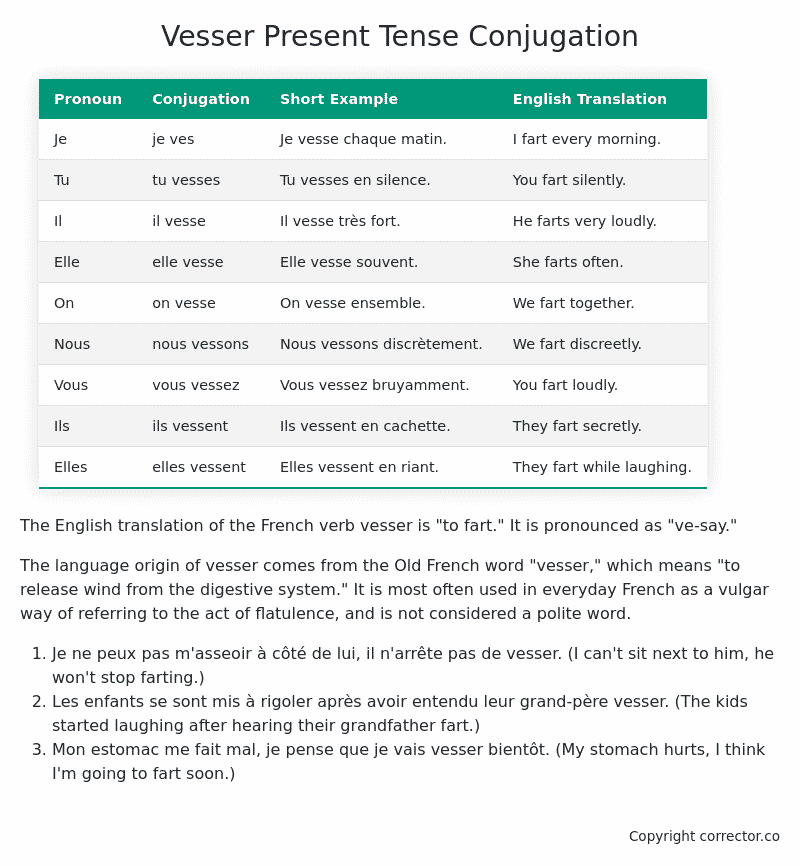Le Present (Present Tense) Conjugation of the French Verb vesser
Introduction to the verb vesser
The English translation of the French verb vesser is “to fart.” It is pronounced as “ve-say.”
The language origin of vesser comes from the Old French word “vesser,” which means “to release wind from the digestive system.” It is most often used in everyday French as a vulgar way of referring to the act of flatulence, and is not considered a polite word.
- Je ne peux pas m’asseoir à côté de lui, il n’arrête pas de vesser. (I can’t sit next to him, he won’t stop farting.)
- Les enfants se sont mis à rigoler après avoir entendu leur grand-père vesser. (The kids started laughing after hearing their grandfather fart.)
- Mon estomac me fait mal, je pense que je vais vesser bientôt. (My stomach hurts, I think I’m going to fart soon.)
Vesser – About the French Present Tense
To take a deep dive into all the French tenses then see our article on Mastering French Tense Conjugation.
Common Everyday Usage Patterns For Le Present
Interactions with Other Tenses
Table of the Present Tense Conjugation of vesser
| Pronoun | Conjugation | Short Example | English Translation |
|---|---|---|---|
| Je | je ves | Je vesse chaque matin. | I fart every morning. |
| Tu | tu vesses | Tu vesses en silence. | You fart silently. |
| Il | il vesse | Il vesse très fort. | He farts very loudly. |
| Elle | elle vesse | Elle vesse souvent. | She farts often. |
| On | on vesse | On vesse ensemble. | We fart together. |
| Nous | nous vessons | Nous vessons discrètement. | We fart discreetly. |
| Vous | vous vessez | Vous vessez bruyamment. | You fart loudly. |
| Ils | ils vessent | Ils vessent en cachette. | They fart secretly. |
| Elles | elles vessent | Elles vessent en riant. | They fart while laughing. |
Other Conjugations for Vesser.
Le Present (Present Tense) Conjugation of the French Verb vesser (this article)
Imparfait (Imperfect) Tense Conjugation of the French Verb vesser
Passé Simple (Simple Past) Tense Conjugation of the French Verb vesser
Passé Composé (Present Perfect) Tense Conjugation of the French Verb vesser
Futur Simple (Simple Future) Tense Conjugation of the French Verb vesser
Futur Proche (Near Future) Tense Conjugation of the French Verb vesser
Plus-que-parfait (Pluperfect) Tense Conjugation of the French Verb vesser
Passé Antérieur (Past Anterior) Tense Conjugation of the French Verb vesser
Futur Antérieur (Future Anterior) Tense Conjugation of the French Verb vesser
Subjonctif Présent (Subjunctive Present) Tense Conjugation of the French Verb vesser
Subjonctif Passé (Subjunctive Past) Tense Conjugation of the French Verb vesser
Subjonctif Imparfait (Subjunctive Imperfect) Tense Conjugation of the French Verb vesser
Subjonctif Plus-que-parfait (Subjunctive Pluperfect) Tense Conjugation of the French Verb vesser
Conditionnel Présent (Conditional Present) Tense Conjugation of the French Verb vesser
Conditionnel Passé (Conditional Past) Tense Conjugation of the French Verb vesser
L’impératif Présent (Imperative Present) Tense Conjugation of the French Verb vesser
L’infinitif Présent (Infinitive Present) Tense Conjugation of the French Verb vesser
Struggling with French verbs or the language in general? Why not use our free French Grammar Checker – no registration required!
Get a FREE Download Study Sheet of this Conjugation 🔥
Simply right click the image below, click “save image” and get your free reference for the vesser Present Tense tense conjugation!

I hope you enjoyed this article on the verb vesser. Still in a learning mood? Check out another TOTALLY random French verb present conjugation!


